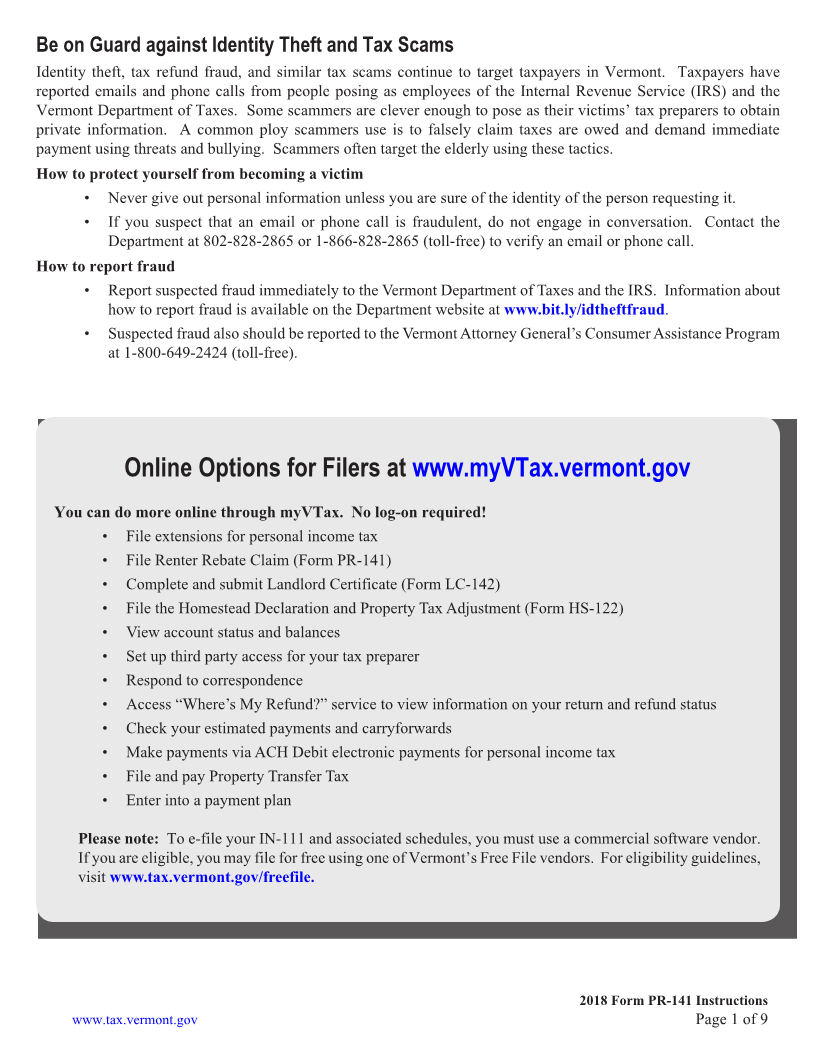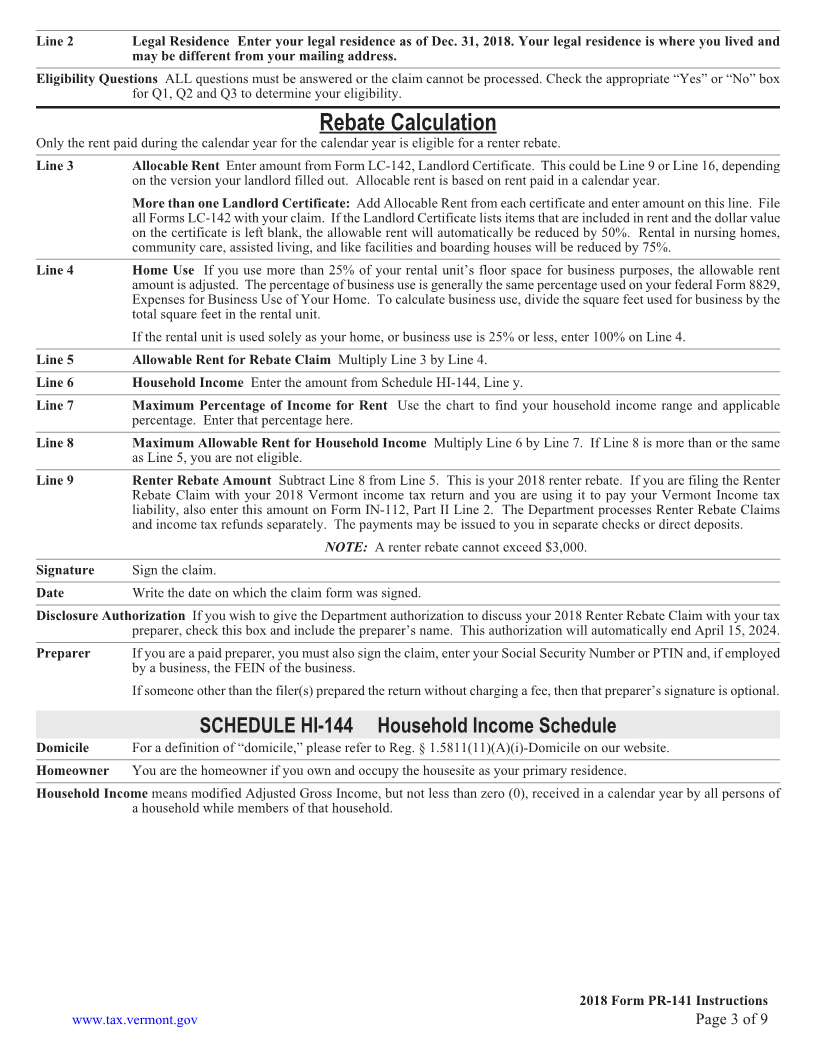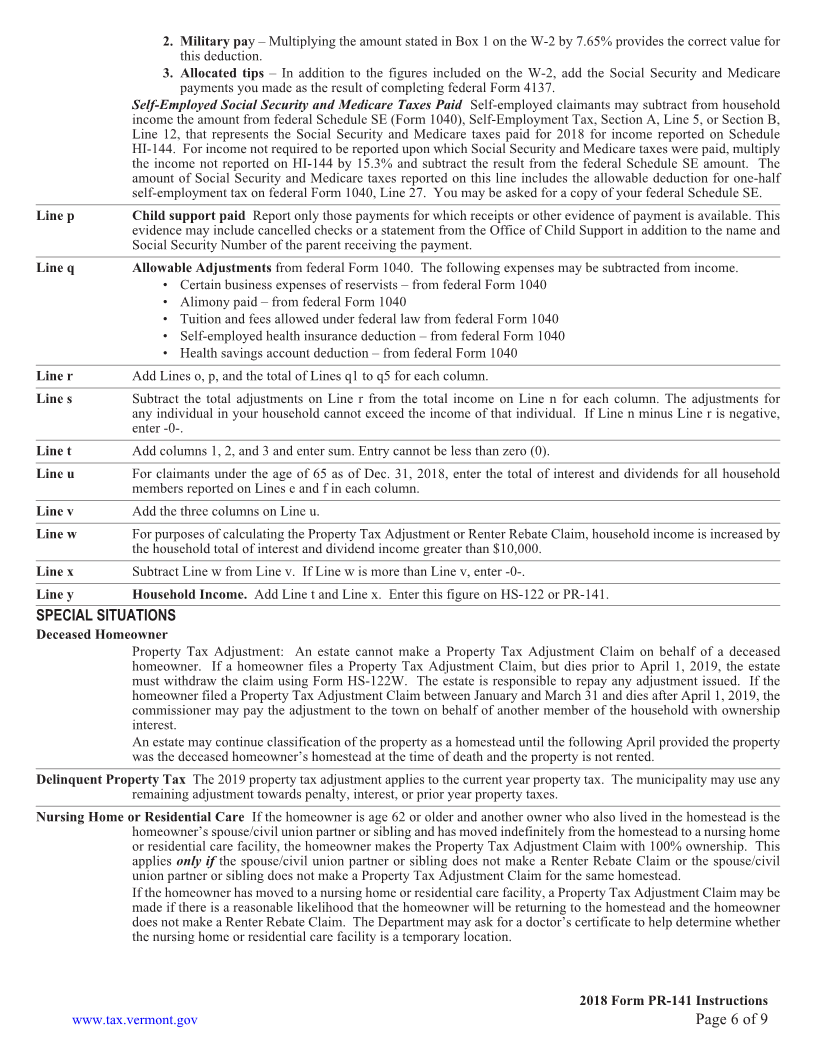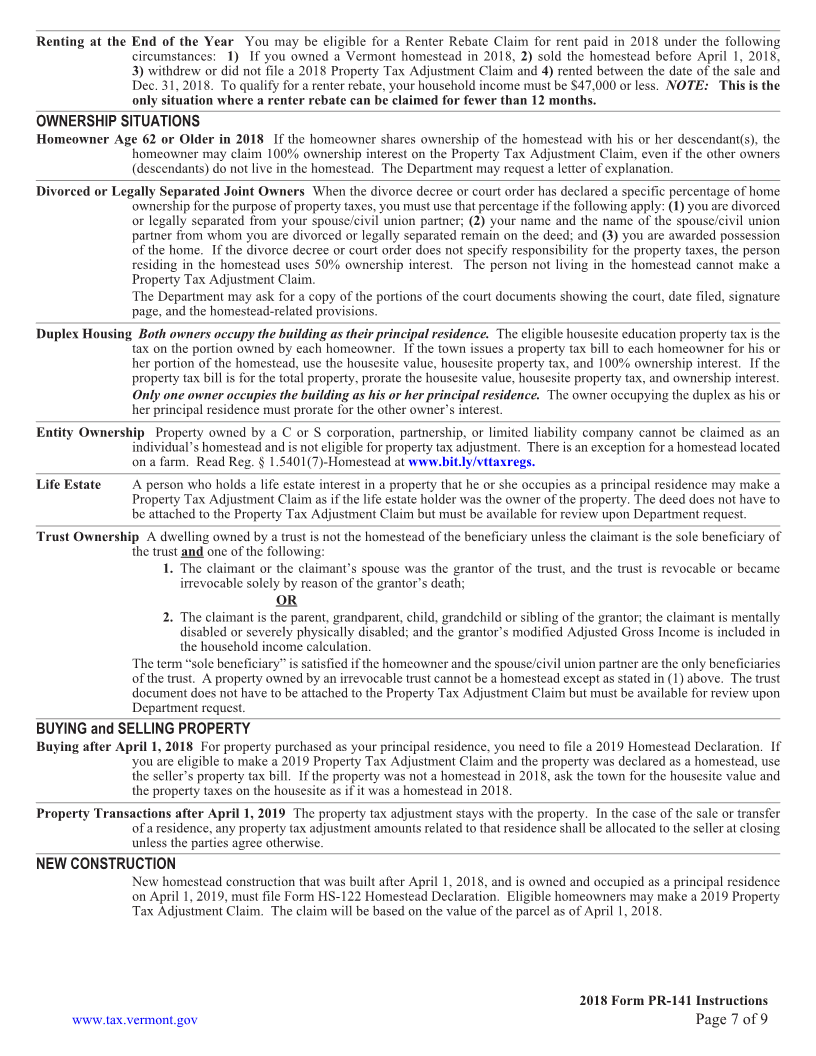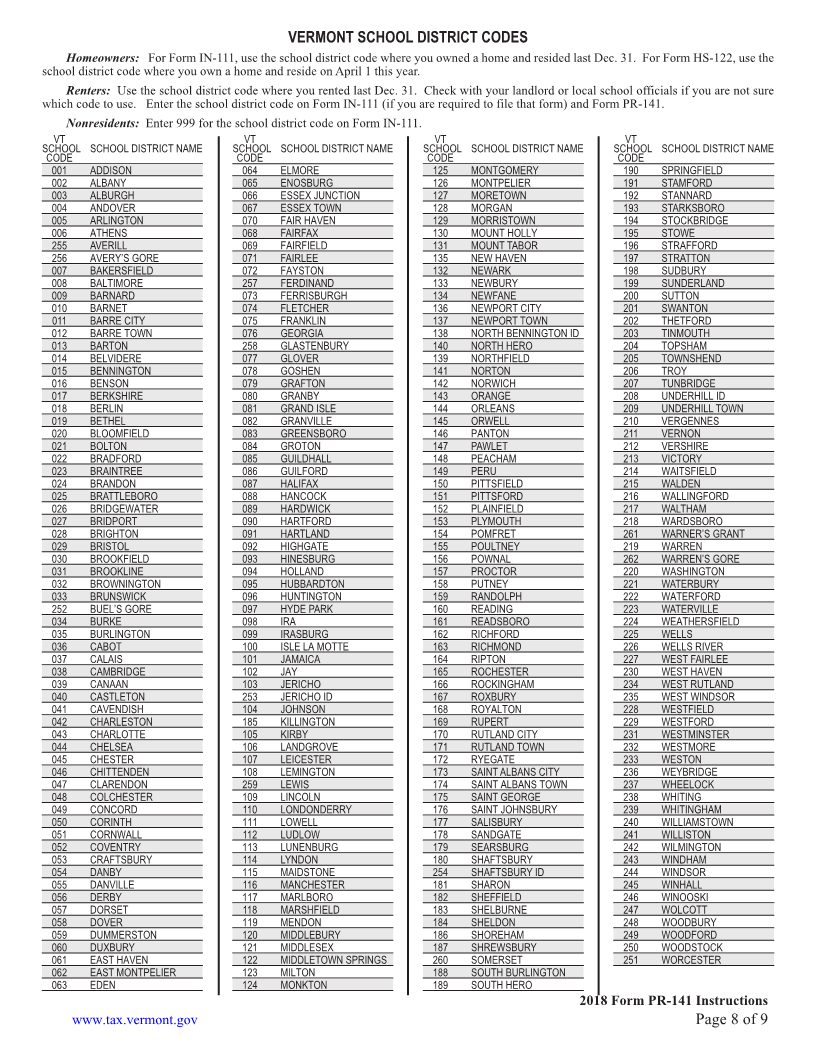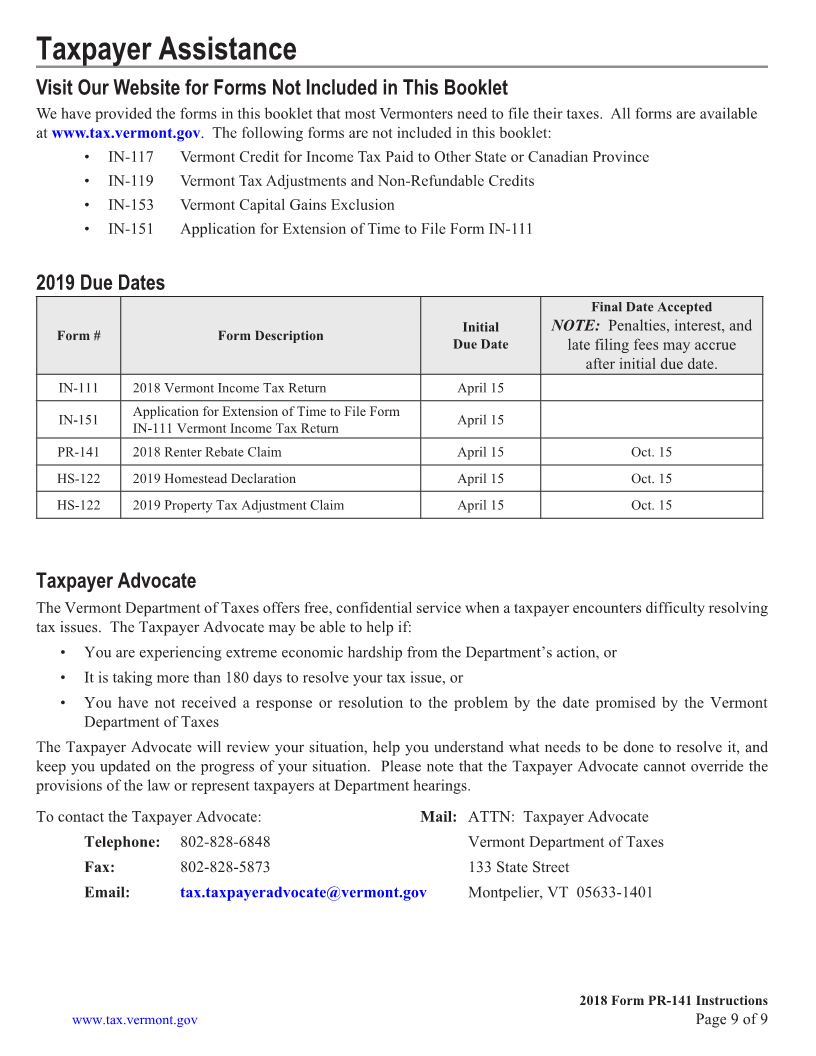- 5 -
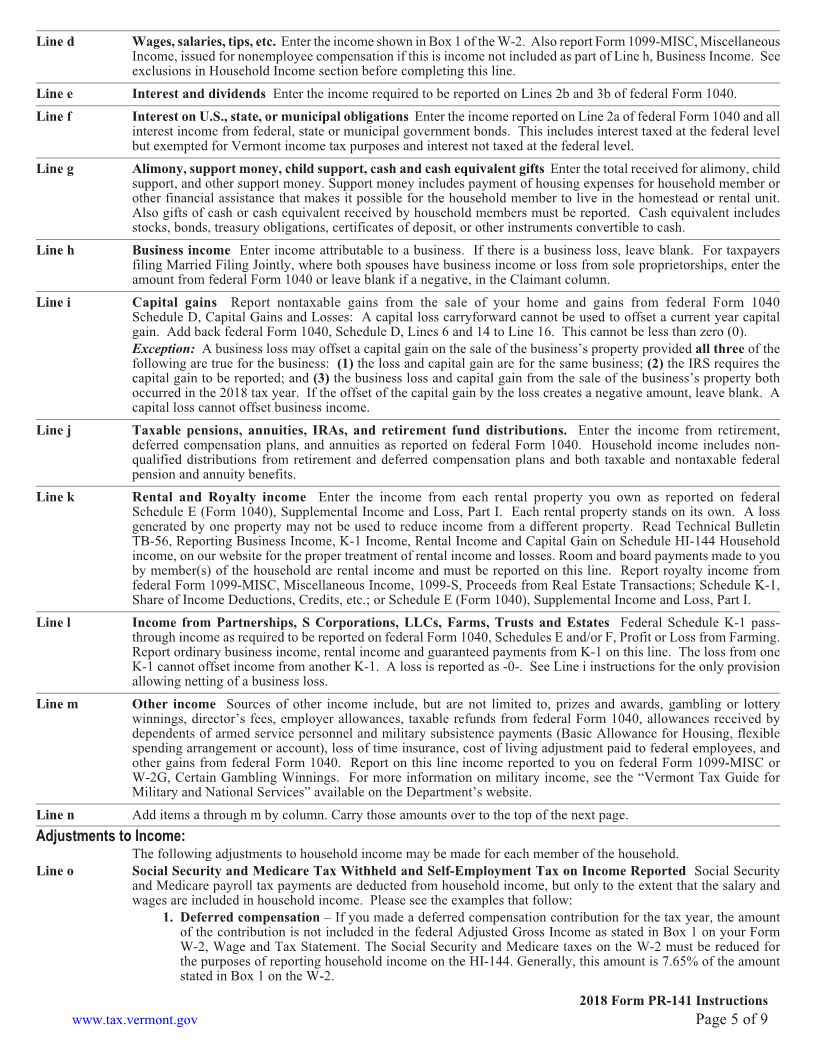
Enlarge image
|
Line d Wages, salaries, tips, etc. Enter the income shown in Box 1 of the W-2. Also report Form 1099-MISC, Miscellaneous
Income, issued for nonemployee compensation if this is income not included as part of Line h, Business Income. See
exclusions in Household Income section before completing this line.
Line e Interest and dividends Enter the income required to be reported on Lines 2b and 3b of federal Form 1040.
Line f Interest on U.S., state, or municipal obligations Enter the income reported on Line 2a of federal Form 1040 and all
interest income from federal, state or municipal government bonds. This includes interest taxed at the federal level Page 5
but exempted for Vermont income tax purposes and interest not taxed at the federal level.
Line g Alimony, support money, child support, cash and cash equivalent gifts Enter the total received for alimony, child
support, and other support money. Support money includes payment of housing expenses for household member or
other financial assistance that makes it possible for the household member to live in the homestead or rental unit.
Also gifts of cash or cash equivalent received by household members must be reported. Cash equivalent includes
stocks, bonds, treasury obligations, certificates of deposit, or other instruments convertible to cash.
Line h Business income Enter income attributable to a business. If there is a business loss, leave blank. For taxpayers
filing Married Filing Jointly, where both spouses have business income or loss from sole proprietorships, enter the
amount from federal Form 1040 or leave blank if a negative, in the Claimant column.
Line i Capital gains Report nontaxable gains from the sale of your home and gains from federal Form 1040
Schedule D, Capital Gains and Losses: A capital loss carryforward cannot be used to offset a current year capital
gain. Add back federal Form 1040, Schedule D, Lines 6 and 14 to Line 16. This cannot be less than zero (0).
Exception: A business loss may offset a capital gain on the sale of the business’s property provided all three of the
following are true for the business: (1) the loss and capital gain are for the same business; (2) the IRS requires the
capital gain to be reported; and (3) the business loss and capital gain from the sale of the business’s property both
occurred in the 2018 tax year. If the offset of the capital gain by the loss creates a negative amount, leave blank. A
capital loss cannot offset business income.
Line j Taxable pensions, annuities, IRAs, and retirement fund distributions. Enter the income from retirement,
deferred compensation plans, and annuities as reported on federal Form 1040. Household income includes non-
qualified distributions from retirement and deferred compensation plans and both taxable and nontaxable federal
pension and annuity benefits.
Line k Rental and Royalty income Enter the income from each rental property you own as reported on federal
Schedule E (Form 1040), Supplemental Income and Loss, Part I. Each rental property stands on its own. A loss
generated by one property may not be used to reduce income from a different property. Read Technical Bulletin
TB-56, Reporting Business Income, K-1 Income, Rental Income and Capital Gain on Schedule HI-144 Household
income, on our website for the proper treatment of rental income and losses. Room and board payments made to you
by member(s) of the household are rental income and must be reported on this line. Report royalty income from
federal Form 1099-MISC, Miscellaneous Income, 1099-S, Proceeds from Real Estate Transactions; Schedule K-1,
Share of Income Deductions, Credits, etc.; or Schedule E (Form 1040), Supplemental Income and Loss, Part I.
Line l Income from Partnerships, S Corporations, LLCs, Farms, Trusts and Estates Federal Schedule K-1 pass-
through income as required to be reported on federal Form 1040, Schedules E and/or F, Profit or Loss from Farming.
Report ordinary business income, rental income and guaranteed payments from K-1 on this line. The loss from one
K-1 cannot offset income from another K-1. A loss is reported as -0-. See Line i instructions for the only provision
allowing netting of a business loss.
Line m Other income Sources of other income include, but are not limited to, prizes and awards, gambling or lottery
winnings, director’s fees, employer allowances, taxable refunds from federal Form 1040, allowances received by
dependents of armed service personnel and military subsistence payments (Basic Allowance for Housing, flexible
spending arrangement or account), loss of time insurance, cost of living adjustment paid to federal employees, and
other gains from federal Form 1040. Report on this line income reported to you on federal Form 1099-MISC or
W-2G, Certain Gambling Winnings. For more information on military income, see the “Vermont Tax Guide for
Military and National Services” available on the Department’s website.
Line n Add items a through m by column. Carry those amounts over to the top of the next page.
Adjustments to Income:
The following adjustments to household income may be made for each member of the household.
Line o Social Security and Medicare Tax Withheld and Self-Employment Tax on Income Reported Social Security
and Medicare payroll tax payments are deducted from household income, but only to the extent that the salary and
wages are included in household income. Please see the examples that follow:
1. Deferred compensation – If you made a deferred compensation contribution for the tax year, the amount
of the contribution is not included in the federal Adjusted Gross Income as stated in Box 1 on your Form
W-2, Wage and Tax Statement. The Social Security and Medicare taxes on the W-2 must be reduced for
the purposes of reporting household income on the HI-144. Generally, this amount is 7.65% of the amount
stated in Box 1 on the W-2.
2018Form PR-141 Instructions
www.tax.vermont.gov Page 5 of 9
|
